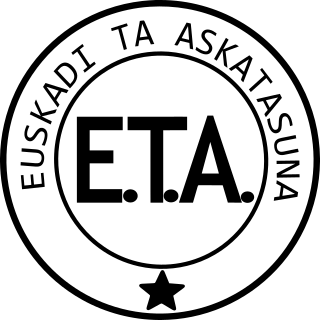
ETA, an acronym for Euskadi Ta Askatasuna, was an armed Basque nationalist and far-left separatist organization in the Basque Country between 1959 and 2018, with its goal being independence for the region. The group was founded in 1959 during the era of Francoist Spain, and later evolved from a pacifist group promoting traditional Basque culture to a violent paramilitary group. It engaged in a campaign of bombings, assassinations, and kidnappings throughout Spain and especially the Southern Basque Country against the regime, which was highly centralised and hostile to the expression of non-Castilian minority identities. ETA was the main group within the Basque National Liberation Movement and was the most important Basque participant in the Basque conflict.

Basque nationalism is a form of nationalism that asserts that Basques, an ethnic group indigenous to the western Pyrenees, are a nation and promotes the political unity of the Basques, today scattered between Spain and France. Since its inception in the late 19th century, Basque nationalism has included Basque independence movements.

The Basque Nationalist Party, officially Basque National Party in English, is a Basque nationalist and regionalist political party. The party is located in the centre of the political spectrum.
Abertzale is a Basque term usually referring to people or political groups who are associated with Basque nationalism.
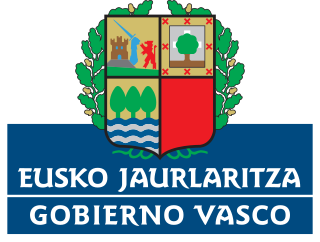
The Basque Government is the governing body of the Basque Autonomous Community of Spain. The head of the Basque government is known as the Lehendakari. The Lehendakari is appointed by the Basque Parliament every four years, after a regional election. Its headquarters are located in the Lakua district of Vitoria-Gasteiz in Álava.

José Antonio Ardanza Garro was a Spanish politician who became the second elected Lehendakari after the approval of the Statute of Autonomy. He was in office between 1985 and 1999.
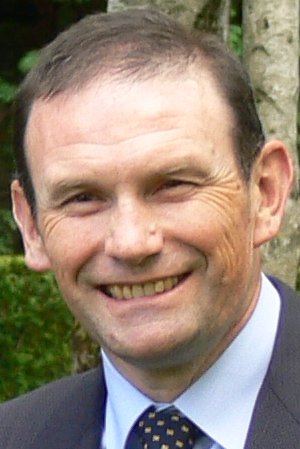
The 2009 Basque regional election was held on Sunday, 1 March 2009, to elect the 9th Parliament of the Basque Autonomous Community. All 75 seats in the Parliament were up for election. The election was held simultaneously with a regional election in Galicia. It would be the first time that the elections for two of the Spanish "historical regions"—namely, those comprising Andalusia, Catalonia, Galicia and the Basque Country itself—were held simultaneously. This would evolve into an unwritten convention in subsequent years, with Basque and Galician elections being held concurrently in 2012, 2016 and 2020.
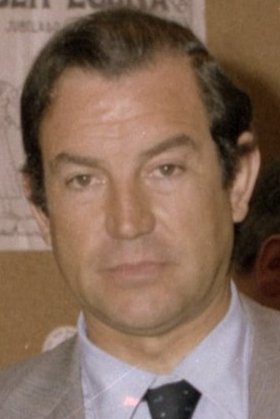
The 1984 Basque regional election was held on Sunday, 26 February 1984, to elect the 2nd Parliament of the Basque Autonomous Community. All 75 seats in the Parliament were up for election.

The Basque conflict, also known as the Spain–ETA conflict, was an armed and political conflict from 1959 to 2011 between Spain and the Basque National Liberation Movement, a group of social, terrorist and political Basque organizations which sought independence from Spain and France. The movement was built around the terrorist organization ETA, which had launched a campaign of attacks against Spanish administrations since 1959. ETA had been proscribed as a terrorist organization by the Spanish, British, French and American authorities at different moments. The conflict took place mostly on Spanish soil, although to a smaller degree it was also present in France, which was primarily used as a safe haven by ETA members. It was the longest running violent conflict in modern Western Europe. It has been sometimes referred to as "Europe's longest war".

The 2012 Basque regional election was held on Sunday, 21 October 2012, to elect the 10th Parliament of the Basque Autonomous Community. All 75 seats in the Parliament were up for election. The election was held simultaneously with a regional election in Galicia. Lehendakari Patxi López announced the parliament's dissolution half a year ahead of schedule as a result of the People's Party (PP) withdrawing their support from his government, prompting Galician president Alberto Núñez Feijóo, who had been scheduling a snap election in Galicia to be held at some point throughout late 2012, to make his decision to have a simultaneous vote.
EH Bildu, short for Euskal Herria Bildu, is a left-wing, Basque nationalist and pro-independence political party and a federation of political parties in Spain. It is the main political force of the abertzale left in Spain. EH Bildu is active in the Spanish autonomous communities of Basque Country and Navarre and in the Treviño enclave of the Burgos Province.

Abertzale left is a term used to refer to the parties or organizations of the Basque nationalist/separatist left, stretching from democratic socialism to communism.

The 2016 Basque regional election was held on Sunday, 25 September 2016, to elect the 11th Parliament of the Basque Autonomous Community. All 75 seats in the Parliament were up for election. The election was held simultaneously with a regional election in Galicia. Lehendakari Iñigo Urkullu announced that the election would be held one month ahead of schedule, on 25 September 2016, based on the "climate of ungovernability" affecting national politics as a result of the ongoing Spanish government formation negotiations, intending to move the regional election as far away as possible from a possible new general election. This prompted Galician president Alberto Núñez Feijóo to hold the Galician regional election in the same date.

Bakartxo Tejeria Otermin is a Basque politician serving as speaker or President of the Basque Parliament since 2012. She is the third woman to hold the position, as well as the longest serving speaker. Tejeria has been a Member of the Basque Parliament for Gipuzkoa since 2001. She is affiliated with the Basque National Party.

Eusko Alkartasuna is a Basque nationalist and social-democratic political party operating in Spain and France. The Basque language name means Basque Solidarity and abbreviated as EA. The party describes itself as a "Basque nationalist, democratic, popular, progressive and non-denominational party". The party has adopted the slogan "Euskal Sozialdemokrazia".
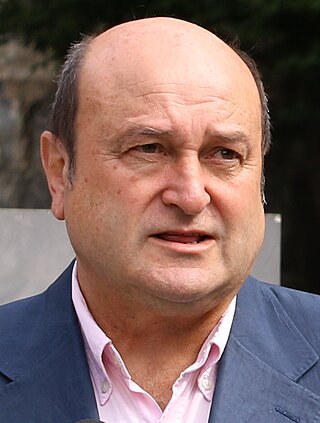
Andoni Ortuzar Arruabarrena is a Spanish Basque politician and journalist, and the president of the Basque Nationalist Party.

The 2020 Basque regional election was held on Sunday, 12 July 2020, to elect the 12th Parliament of the Basque Autonomous Community. All 75 seats in the Parliament were up for election. The election was initially scheduled for 5 April 2020 but was postponed as a result of the COVID-19 pandemic. It was held simultaneously with a regional election in Galicia.

Women in the Basque Nationalist Party in Francoist Spain were involved in leadership positions from an early period. The Basque Nationalist Party (PNV) was founded prior to the Second Spanish Republic in Bilbao, as a conservative Roman Catholic organization. They initially tried to be neutral during the Civil War, but later more openly opposed Nationalist forces. This led to repression and investigation after the war of women PNV members, and wives and daughters of male PNV members. Emakume Abertzale Batza, PNV's women political section, was operated in exile in this early period.

Gotzone Sagardui is a Spanish politician affiliated with the Basque National Party. As of 8 September 2020, she serves as Minister of Health in the Third Urkullu Government led by Iñigo Urkullu. She previously served as city councillor in Bilbao from 2017 to 2020, also serving as deputy mayor from 2019. She was a Member of the Basque Parliament from 2016 to 2017. She holds a degree in Medicine from the University of the Basque Country.

The 12th Basque Parliament is the current meeting of the Basque Parliament. Its membership was determined by the results of the 2020 regional election held on 12 July 2020. It met for the first time on 3 August 2020.

















